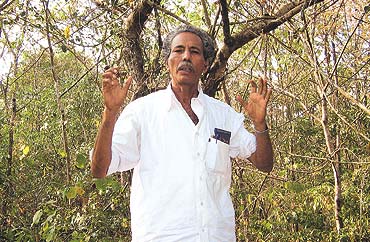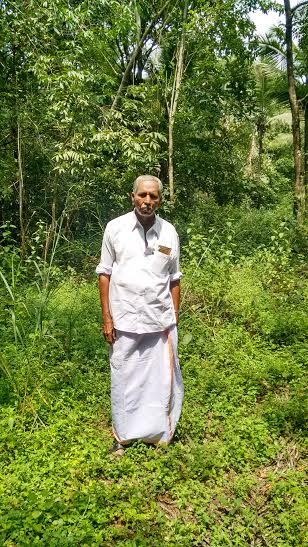‘Forest Man’ From Kerala
By Roshan Shah
09 November, 2014
Countercurrents.org

Almost 40 years ago, Abdul Kareem bought five acres of land in what was then a sparsely inhabited area in Kasargod district in Malabar, northern Kerala. As a travel agent his job involved travelling around five days a week. He thought he would use the land as a get-away to relax once in a while when he managed to get time off from his hectic work. Shortly after, he bought some more land, and in just a few years, his 30-odd acres were transformed into a thick, vibrant forest, making Abdul Kareem one of the few people in India to have actually created a forest—and that too almost single-handedly!
Abdul Kareem hadn’t bought the land in order to conserve the environment or do something about global warming, but in a while, as his forest grew, he turned into a passionate Nature lover, with his efforts bringing him numerous awards and much appreciation. ‘Caring for Nature is one major mission of my life,’ this enthusiastic, cheerful 68 year-old man says.
Abdul Kareem was born in a village near the sea. ‘There was no forest there, but you could see hills and jungles far away in the distance. As a child, I would fantasize about forests—they seemed so enchanting! Even then I loved plants, and I planted many saplings around my home.’ he says.
When Abdul Kareem bought the land, much of it was bare. The thick layer of laterite rock that covered much of the area did not allow for much vegetation to survive. But that did not deter this intrepid man. When he planted a hundred saplings, hoping to green the land, and only one survived (the rest wilted away in the heat), he did not give up. ‘I didn’t lose hope. I was inspired by the one sapling that survived!’ he relates. The next year he planted 500 saplings, and they all flourished!
Abdul Kareem lovingly tended to the saplings for a year, and after that they took care of themselves, with no human interference—not even needing to be watered or fertilized by human hands. ‘I let the forest grow naturally,’ he says. In a few years, the land was bursting with greenery, a dense forest hosting almost 300 plant species. Birds attracted by the foliage did their bit to help the forest grow by dropping seeds that they had picked up elsewhere.
Trudging along a mud-path that snakes its way through the forest, for a moment you might think you are in the middle of a wild life sanctuary, so dense is it! Abdul Kareem identifies certain plants as we move ahead. ‘This is an orchid!’ he says with childlike enthusiasm, ‘and that’s a shampoo tree! You can make shampoo out of it! Can you imagine! And that, there, is a medicinal plant!’

The hills around the forest were probably once under thick forest cover and home to numerous wild animals. Now, almost all the land is under cultivation—mainly cash crops like rubber—and the wildlife has probably almost completely disappeared. Abdul Kareem’s forest, however, attracts several species: wild boars, jackals, and, of course, snakes, butterflies, various insects and numerous birds, including peacocks.
We walk up to a little pond, and Abdul Kareem insists that I sample the water. ‘Natural water!’ he says gleefully. When I hesitate, he insists, ‘It’s very, very clean!’ He explains how by allowing the land to regenerate and turn into a forest, the water table in the area, which had sunk very low, has risen considerably. The temperature in and around the forest, he adds, is substantially less than elsewhere in the area. ‘See how even a little forest can make a difference to global warming!’ he exclaims.
As we head to the simple little cottage in the middle of the forest where he and his wife live, I ask Abdul Kareem if he makes any money out of the forest. ‘None at all. Earning from it is not my intention,’ he replies. ‘I don’t sell anything that comes from the forest.’
This large-hearted man allows his neighbours to draw water from the wells and ponds in the forest free of cost. For people who might want to pluck a few leaves or fruits of the medicinal plants that the forest abounds in he doesn’t charge anything.
‘A man from a top hotel chain once approached me. He wanted to buy the land to convert it into a hotel or an ayurvedic resort. He would have offered a huge sum of money, and even said I could remain here, in a small portion of the land, but I declined,’ Abdul Kareem says. ‘Even if you offer to let me stay in the White House, I’d rather stay in my forest! Almost all my children live in the Gulf, and although I occasionally visit them, I can’t get to stay there more than just a few days. After that, I pine to rush back to the forest!’
Land prices in the area have soared in recent years, and the cost of Abdul Kareem’s 32 acres of forest land must run into several crores of rupees now. Yet, the man is happy not earning any money from the forest, living in his simple home and making a living as a small travel agent and managing a petrol pump.
Truly amazing, isn’t it?
After taking me around the forest, Abdul Kareem says, ‘Spend the night here if you like. There’s a room here where you can stay. You can learn even more.’
The offer does seem tempting. For a moment, I imagine sitting in the verandah as the sun goes down, listening to frogs croaking and crickets chirping, and maybe even spotting a jackal on the prowl and then waking up to the plaintive cry of a peacock. But the auto-rickshaw I came in is waiting, and so I give Abdul Kareem a parting hug.
‘Your forest is truly amazing, and so are you!’ I say.
Roshan Shah is a wandering freelance writer
Comments are moderated

